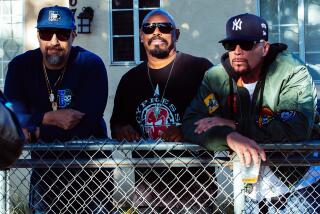KCET Claims Bias, Won’t Air Any New ‘Africa Now’ Shows : Television: A conservative media group claims victory after its letter-writing campaign against the public affairs program.
- Share via
Claiming that the series “South Africa Now” is biased in favor of the African National Congress, programmers at Los Angeles public-television station KCET have decided not to carry the public-affairs program when its new season begins in November.
The Committee on Media Integrity, a conservative media coalition, claimed victory Friday for the decision. The group, led by David Horowitz, a former Ramparts magazine editor who went on to co-author the book “Destructive Generation: Second Thoughts About the ‘60s,” has been waging a letter-writing campaign and threatening legal action against KCET Channel 28 for airing “South Africa Now” and other programs that it claims have a leftist bias.
Horowitz, who said he is opposed to apartheid but also is opposed to the African National Congress, said that he had had several meetings about “South Africa Now” with Stephen Kulczycki, senior vice president and station manager at KCET.
“I felt that the show was posing as a news report, but it was really just doing propaganda,” Horowitz said.
Kulczycki denied Friday that pressure from Horowitz’s group had anything to do with his decision not to renew the series, which has been running on Sundays at 9 a.m. He said that “South Africa Now,” which is produced in New York by Globalvision Inc. and is seen on 80 U.S. public-TV stations, gives only cursory attention to views of liberal whites and blacks, as well as to the South African government and others who differ with the policies of the African National Congress, the party of Nelson Mandela.
“As time has gone by, it appears more clear that the main issue in South Africa is not whether there will be apartheid, but what kind of anti-apartheid government in South Africa would come into power,” Kulczycki said. “When it (‘South Africa Now’) was an advocacy program and the only issue was apartheid, that was something many people were willing to accept. But in recent weeks and months, the story has become more complicated and the producers don’t seem to want to present a broad spectrum of views.”
Kulczycki said that KCET was planning to run a number of specials about South Africa, which would present all sides of the issues there. And he said that if Globalvision were to produce specials instead of a series, he would consider them “on a case-by-case basis.”
The decision not to renew “South Africa Now” has sparked anger and surprise among leaders in Southern California’s African-American community, who have begun to wage a telephone and letter-writing campaign of their own to urge the program’s re-instatement.
“Whatever happened to the marketplace of ideas?” said Gerald Horne, a professor of black studies at the University of California at Santa Barbara. “I guess KCET is saying that their marketplace is limited, that you can only do a certain amount of shopping there.”
Los Angeles City Councilman Robert Farrell, who has been active in the anti-apartheid movement, said Friday that he is so outraged by KCET’s action that he is considering asking the council to withhold funding from the station next year. Last year, city-approved grants to KCET totaled $25,000.
“KCET puts its integrity on the line with this decision,” Farrell said. Even if the program does focus on the African National Congress, Farrell said, “The ANC is in fact engaged in a discussion with the South African government leading to what is going to be a democracy in South Africa. (KCET) says the ANC is not the voice of the South African majority--(South African President) F. W. De Klerk obviously thinks it is.”
Farrell said that he is working with other leaders in the black community to oppose the decision. And the councilman said he plans to meet personally with members of the KCET board of directors and with station president William Kobin.
Horne said that he has watched “South Africa Now” every week since it went on the air in 1989 and does not believe that it is biased.
“It covered the black consciousness movement, it covered Desmond Tutu, it covered the Pan African Congress, and it covered the white minority regime,” Horne said. “I take it that those who opposed ‘South Africa Now’ would also have opposed a show on opposition to Idi Amin or the opposition to Germany in 1936 and wanted balance there.”
Danny Schechter, executive producer of “South Africa Now,” said that he resented the claim that his program was biased. “I have won several news Emmys, including two national Emmys for work on (ABC’s) ‘20/20,’ where I was a producer for nine years,” Schechter said. “I’ve been a Nieman Fellow at Harvard. I’ve been covering this issue for 20 years.”
More to Read
The complete guide to home viewing
Get Screen Gab for everything about the TV shows and streaming movies everyone’s talking about.
You may occasionally receive promotional content from the Los Angeles Times.






